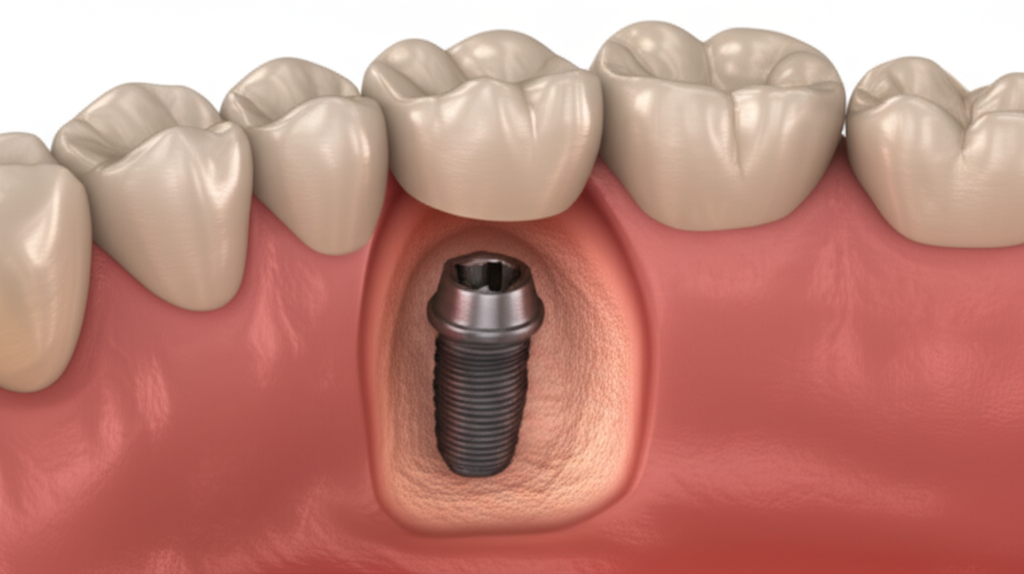
What Happens If a Dental Implant Breaks? Your Guide to Symptoms, Causes & Solutions
Ever wondered what happens if a dental implant breaks? I’ve heard this question a lot, and trust me, it’s a topic worth talking about. If your dental implant feels loose, hurts, or you hear a strange crack, you’re probably worried. Don’t panic! This article walks you through everything you need to know—signs to watch for, what causes implant problems, what to do right away, treatment options, repair costs, and how to avoid trouble in the first place. Keep reading, and you’ll feel ready to face any dental implant issue head-on.
Table of Contents
Why Do Implants Break? Understanding the Problem
Let’s be honest—no one thinks their dental implant will ever break. When it does, it feels scary and confusing. Dental implant breakage is not common, but when it happens, it can be a real hassle.
Here’s what’s going on: Implants break for a few reasons. Sometimes it’s a part inside, like the screw or the small connector. Other times, something goes wrong with the main post (the part in your jawbone) or the crown (the fake tooth part on top).
Imagine this: You’re eating lunch and suddenly feel a crack in your fake tooth. Panic sets in. What happens next? That’s what we’ll talk about together in this article.
How Can I Tell If My Dental Implant Is Broken?
How do you know if your implant is broken? Some signs are pretty clear, while others might be a surprise. Here’s what to look for:
- Pain or Discomfort: If your implant suddenly hurts, throbs, or feels sharp, take notice. Implants usually shouldn’t hurt.
- A Loose or Wobbly Tooth: Your implant crown or the whole tooth wiggles when you touch it or chew.
- Clicking or Cracking Sounds: Sometimes, a broken part inside can click or squeak when you eat or talk.
- Swelling and Redness: The gum around a broken implant can get puffy, sore, or bleed a bit.
- Visible Cracks or Gaps: If the crown looks cracked or something seems “off,” you might have a problem.
- Trouble Chewing or Talking: A broken implant can move when you use it, making eating feel weird.
Here is a table with some common signs and what they can mean:
| Symptom | What It Suggests |
|---|---|
| Pain/swelling | Infection or implant failure |
| Loose implant/crown | Broken screw, failed connector |
| Clicking/cracking sound | Break inside the implant |
| Visible crack/break | Crown or post fracture |
| Bleeding/pus | Infection (peri-implantitis) |
If you have one or more of these, your implant may have broken or is about to break. Don’t ignore these signs. The sooner you act, the easier it is to handle.
What Should I Do First If My Implant Breaks?
Here’s the big question: What should you do right away?
Don’t touch or move the implant! Playing with it can make things worse or start an infection.
Here’s what I always tell my friends and patients:
Acting quickly can stop bigger problems or infections. If you wait, little problems can turn into big ones.
What Causes Dental Implant Breakage?
Why does a “tough” dental implant break? Good question! A few main things can go wrong—and some might surprise you.
1. Broken Parts
- Screw Break: Sometimes the tiny metal screw that holds things together snaps, usually from too much force or being screwed in too tight.
- Connector Break: The part between the implant and crown can break if it’s made badly or has a weak spot.
- Cracked Crown: The fake tooth part can chip if you bite something hard or grind your teeth.
2. Bad Bone Connection
- Failed Bonding with Bone: Sometimes the implant doesn’t “stick” to your jawbone well.
- Bone Loss: If your bone gets smaller or infected (called peri-implantitis), the implant can get shaky.
- Health Problems: Things like diabetes or weak bones can make the area around your implant less strong. Smoking makes healing harder, too.
3. Too Much Force or Injury
- Grinding Teeth: Clenching or grinding (often at night) puts a lot of strain on implants.
- Bad Bite: If your top and bottom teeth don’t line up well, some teeth or implants get hit too much.
- Accidents: Falls, sports injuries, or chewing ice can damage an implant.
4. Material or Placement Problems
- Cheap Materials: Bad metals or ceramics break more easily.
- Bad Placement: Implants put in at the wrong angle or in thin bone have a bigger risk of trouble.
- Rushing: Getting a crown too soon can make the implant fail.
Even though dental implants are strong—especially those made from titanium or zirconia—they’re not unbreakable. That’s why picking a good implant dental laboratory matters so much. They use strong materials and the right methods to help keep your implant safe.
Can My Broken Implant Be Fixed?
You’re probably thinking, Can a broken dental implant be fixed— or is it done for? Good news: A lot of the time, yes, it can be fixed!
What Might Happen
- Small Problems: If just the screw or crown broke, your dentist can usually switch it out without removing the whole implant. This is the “best-case” fix—the part in your jaw is still okay.
- Bigger Breaks: If the actual post in your bone snapped, taking it out and getting a new implant might be needed. Sometimes, the dentist needs to add more bone (this is called grafting) before the new one goes in.
Think about it like a table: Sometimes you just tighten a screw, and sometimes you need a new leg.
The most important thing? A dentist with lots of experience and a good dental lab make all the difference in how long your fix will last.
How Do Dentists Find Out What’s Wrong?
Dentists don’t just guess when it comes to a broken implant—they use good tools to find the problem.
What Dentists Do
This careful check-up helps you get the right fix—no guessing, no wasted visits.
Repair vs. Replace: What Are My Options?
After checking things out, your dentist has a few choices:
1. Fix the Broken Part
- Screw or connector replacement: If just a dental implant screw or the link between is broken, it can be swapped out.
- Crown replacement: If the “tooth” cracked, a new one can be made and put on.
2. Take Out and Replace the Implant
- Sometimes, the whole implant is broken. The old one is removed, you might need to heal or add bone, and then a new implant can go in after a while.
- This is more work but works well if done right.
3. Other Choices
- Dental bridges or partial dentures are options if the bone or mouth needs to heal before another implant.
Table: Treatment Options at a Glance
| Problem | Treatment Option |
|---|---|
| Broken crown | New custom crown |
| Broken screw/connector | Replace screw/connector |
| Broken implant post | Remove, maybe bone graft, new implant |
| Infection/bone loss | Treat infection, maybe take out implant |
The dentist’s experience and a good implant dental laboratory matter a lot here. They help your fix or new implant last longer.
How Much Will It Cost to Fix a Broken Implant?
Money is always a big deal, right? Here’s a look at typical dental implant repair and replacement costs:
- Fixing a screw or connector: $500–$2,000
- Replacing a crown: $1,000–$2,000 (depends on what it’s made of—ceramic, zirconia, etc.)
- Taking out a bad implant and putting in a new one (with bone added): $3,000–$8,000+
- Other treatments (like bone grafts): Can add $500–$3,000
Insurance helps sometimes: You might get some of it paid for—often if it’s because of an accident or the plan covers it. Ask your dentist’s office to check.
Remember, cheaper isn’t always better in dental care. You don’t want to take risks when it comes to something that stays in your mouth for years!
How Can I Stop My Implant From Breaking Again?
Nobody wants implant trouble twice. Here’s how you can help your implant last for years:
With good daily habits and the right dentist, your dental implant can last ten years or more—even for life!
What’s the Long-Term Outlook?
Here’s some good news. Dental implant success rates are very high. Research shows about 95–98% of dental implants still work well after ten years.
- If your implant is fixed right, it should be as strong as a new one.
- Fixed implants last just as long as first-time ones—as long as what broke it the first time (like grinding, infection, or bite issues) is sorted out.
- Most people never have a problem again, especially with good care and the best materials.
Life after an implant fix can be easy. You’ll chew, smile, and laugh as always, and might even forget you have an implant. Now, that’s a good ending!
Frequently Asked Questions
Q: How common is it for dental implants to break or fail?
A: Actual breaks are rare. Success is over 95% after ten years. Things like a loose screw or a cracked crown happen more than the entire implant splitting.
Q: Can I still eat like normal with a dental implant?
A: Yes! Once repaired, a good implant lets you chew most food—just don’t bite really hard things.
Q: Does a broken implant hurt?
A: Sometimes there’s pain, but not always. Swelling, redness, or clicking can also be warning signs.
Q: What if I wait to fix a broken implant?
A: Waiting can let infection or bone loss get worse. Fixing it early is easier, quicker, and less expensive.
Q: Are ceramic or metal implants better?
A: Both work well, but titanium is still the main one for strength. Ceramic looks a bit prettier but can be more breakable.
Summary: What to Remember
- Dental implants can break, but it’s not common.
- Look out for: Pain, looseness, cracks, swelling, or strange noises.
- Act right away: Call your dentist, don’t chew on that side, and save any loose pieces.
- Main causes: Too much force, grinding, accidents, or infection.
- Dentists can usually fix or change most implants.
- Good care and smart choices help implants last a long time.
- Success rates are high, so you can smile confidently.
It’s normal to be worried if your implant breaks, but you’re not alone. Learn the signs, act fast, and go with a dental team that works with a strong dental lab. Want to know more about dental implants or need help fast? Visit our detailed implant resource or ask for a personal check-up.








